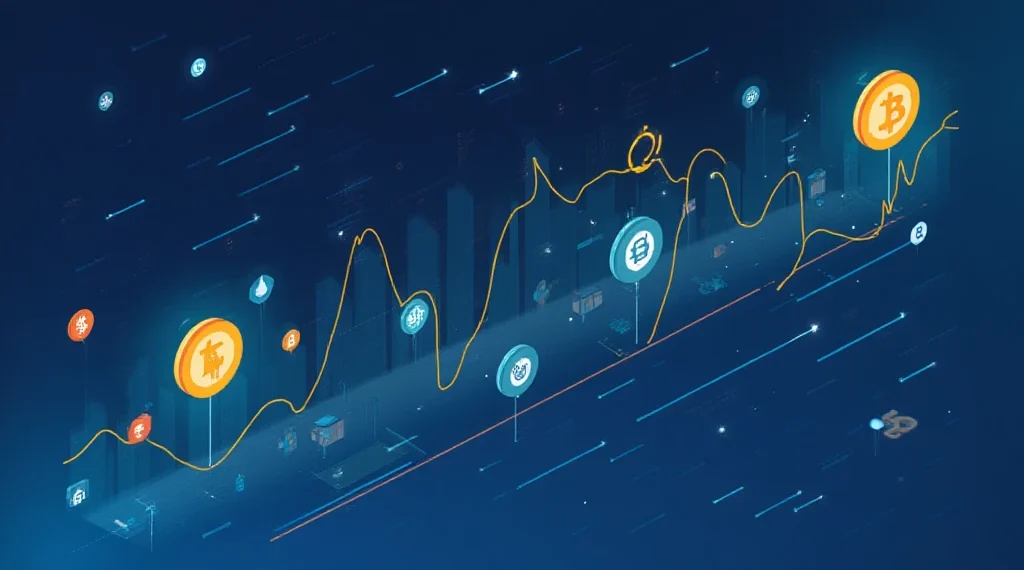<h1>Gas Fee Volatility in the Crypto Market</h1>
<p>With a staggering <strong>$4.1 billion</strong> lost in DeFi hacks in 2024, understanding the transaction costs in the cryptocurrency space has never been more crucial. Gas fee volatility can significantly affect crypto users, especially in rapidly fluctuating markets. This guide dives into gas fees, their volatility, and strategies to navigate them on platforms like OKHTX.</p>
<h2>Understanding Gas Fees</h2>
<p>Gas fees are payments made by users for the computational power needed to process transactions on blockchain networks. Akin to highway tolls, they vary based on network demand. These fees can fluctuate wildly, particularly during peak usage times, leading to unexpected transaction costs for users. </p>
<h3>Factors Influencing Gas Fee Volatility</h3>
<ul>
<li><strong>Network Congestion:</strong> When many users attempt to transact simultaneously, gas fees soar.</li>
<li><strong>Market Demand:</strong> Increased interest in specific cryptocurrencies can lead to spikes in transaction costs.</li>
<li><strong>Technological Updates:</strong> Changes to a blockchain protocol can impact how fees are calculated and charged.</li>
</ul>
<h2>The Impact of Gas Fee Volatility on Users</h2>
<p>For users, gas fee volatility is more than just a number. It‘s a barrier to trading and asset movement. Excessive fees can deter engagements, especially for smaller transactions. In Vietnam, for instance, a significant surge in user growth (estimated at <strong>150%</strong> in 2024) complicates the landscape, as many new investors are unprepared for such fluctuations.</p>
<h3>Strategies to Manage Gas Fees</h3>
<ul>
<li>Utilize Layer–2 solutions for reduced fees and faster transactions.</li>
<li>Monitor gas prices in real–time using tools like <a href=“https://hibt.com“>hibt.com</a>.</li>
<li>Choose optimal times for transactions, ideally during off–peak hours when fees are lower.</li>
</ul>
<h2>Is There a Future for Stable Gas Fees?</h2>
<p>The ongoing development of payment systems within the crypto sphere explores a future where gas fees could stabilize. Innovations such as base–layer fee estimation, alternative consensus mechanisms, and predictive analytics could bring a new era of user–friendly transaction costs. </p>
<h3>Conclusion</h3>
<p>In the volatile world of cryptocurrencies, understanding and managing gas fee volatility is essential for users looking to optimize transactions. The growth of the Vietnamese market reflects a broader trend, highlighting the importance of preparing for market shifts. By leveraging tools and strategies, users can navigate these fluctuations effectively, ensuring their experience remains positive and productive.</p>
<p>As the cryptocurrency space evolves, staying informed is key. At OKHTX, we are committed to providing our users with the resources they need to thrive in this dynamic market. </p>
<h2>Expert Insights</h2>
<p>Authored by <strong>Dr. Nghia Tran</strong>, a seasoned blockchain analyst with over <strong>30</strong> published papers in decentralized finance, Dr. Tran has led audits on various blockchain projects, ensuring compliance and security guidelines. As the crypto landscape evolves, his insights remain invaluable.</p>
<p>With a staggering <strong>$4.1 billion</strong> lost in DeFi hacks in 2024, understanding the transaction costs in the cryptocurrency space has never been more crucial. Gas fee volatility can significantly affect crypto users, especially in rapidly fluctuating markets. This guide dives into gas fees, their volatility, and strategies to navigate them on platforms like OKHTX.</p>
<h2>Understanding Gas Fees</h2>
<p>Gas fees are payments made by users for the computational power needed to process transactions on blockchain networks. Akin to highway tolls, they vary based on network demand. These fees can fluctuate wildly, particularly during peak usage times, leading to unexpected transaction costs for users. </p>
<h3>Factors Influencing Gas Fee Volatility</h3>
<ul>
<li><strong>Network Congestion:</strong> When many users attempt to transact simultaneously, gas fees soar.</li>
<li><strong>Market Demand:</strong> Increased interest in specific cryptocurrencies can lead to spikes in transaction costs.</li>
<li><strong>Technological Updates:</strong> Changes to a blockchain protocol can impact how fees are calculated and charged.</li>
</ul>
<h2>The Impact of Gas Fee Volatility on Users</h2>
<p>For users, gas fee volatility is more than just a number. It‘s a barrier to trading and asset movement. Excessive fees can deter engagements, especially for smaller transactions. In Vietnam, for instance, a significant surge in user growth (estimated at <strong>150%</strong> in 2024) complicates the landscape, as many new investors are unprepared for such fluctuations.</p>
<h3>Strategies to Manage Gas Fees</h3>
<ul>
<li>Utilize Layer–2 solutions for reduced fees and faster transactions.</li>
<li>Monitor gas prices in real–time using tools like <a href=“https://hibt.com“>hibt.com</a>.</li>
<li>Choose optimal times for transactions, ideally during off–peak hours when fees are lower.</li>
</ul>
<h2>Is There a Future for Stable Gas Fees?</h2>
<p>The ongoing development of payment systems within the crypto sphere explores a future where gas fees could stabilize. Innovations such as base–layer fee estimation, alternative consensus mechanisms, and predictive analytics could bring a new era of user–friendly transaction costs. </p>
<h3>Conclusion</h3>
<p>In the volatile world of cryptocurrencies, understanding and managing gas fee volatility is essential for users looking to optimize transactions. The growth of the Vietnamese market reflects a broader trend, highlighting the importance of preparing for market shifts. By leveraging tools and strategies, users can navigate these fluctuations effectively, ensuring their experience remains positive and productive.</p>
<p>As the cryptocurrency space evolves, staying informed is key. At OKHTX, we are committed to providing our users with the resources they need to thrive in this dynamic market. </p>
<h2>Expert Insights</h2>
<p>Authored by <strong>Dr. Nghia Tran</strong>, a seasoned blockchain analyst with over <strong>30</strong> published papers in decentralized finance, Dr. Tran has led audits on various blockchain projects, ensuring compliance and security guidelines. As the crypto landscape evolves, his insights remain invaluable.</p>

















